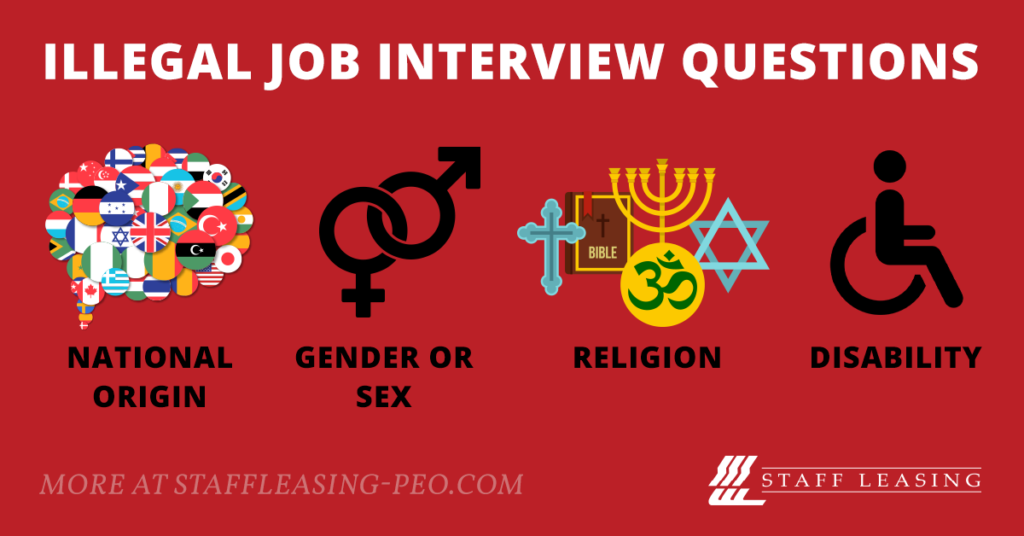If you’re hiring, you’re making a risky move unless you know the HR laws you need to follow. Some of the most commonly overlooked rules apply to the hiring process, particularly the interview process. Before you schedule another interview, read over these guidelines and prohibited interview questions for New York employers.
General Guidelines for New York Interview Questions
It’s important to know what interview questions are fair game, and which are illegal under the Equal Employment Opportunity Act (EEOA), New York State Human Rights Law (NYSHRL), and New York City Human Rights Law (NYCHRL) and other labor laws.
A general rule to follow: avoid questions on application forms or in interviews that express any limitation, specification, or discrimination as to age, race, creed, color, national origin, military status, sex (including gender identity), sexual orientation, disability, predisposing genetic characteristics, marital status, or domestic violence victim status.

When you’re interviewing a candidate, you might be eager to get to know them, so it seems natural to gravitate towards topics like hobbies, family, or personal history. However, an effective interview is about qualifying them for the position, not learning details about their personal life. Some questions that seem natural to ask when getting to know someone are actually grounds for a discrimination lawsuit.
Illegal Interview Questions by Topic
While all possible types of problematic interview questions are too numerous to list, here are some sample interview topics and questions that could give rise to a claim for discrimination.
Salary History
In January of 2020, it became illegal for public and private employers of any size in New York State to ask about an applicant’s salary history during the hiring process, including in advertisements for positions, on applications, or in interviews. New York isn’t the only state to prohibit such questions as:
- “How much did you make at your prior position?”
- “What was your starting pay at your last job?”
Rather than rely on an applicant’s previous salary, employers and job applicants can now engage in salary negotiations focused on the applicant’s qualifications and requirements for the job to set a salary. An employer may ask an applicant for their salary expectations for the position instead of asking what the applicant earned in the past.
An applicant can disclose this information if they wish to a prospective employer, for example, to justify a higher salary or wage, as long as it is being done without prompting from the prospective employer. If an applicant voluntarily and without prompting discloses salary history information, the prospective employer may factor in that voluntarily disclosed information in determining the salary for that person. You may not, for example, pose an “optional” salary history question on a job application seeking a voluntary response.
Work/Visa Status and Citizenship
While employers may ask if an employee is eligible to work in the United States, they generally may not inquire about an applicant’s place of birth or immigration status. You may tell the applicant that proof of citizenship or a permanent immigration visa will be required at the time of employment.
An employer cannot ask:
- “Are you a citizen?”
- “What type of work visa do you have?”
- “Where are you (or your parents) from?”
- “What was your first language?”
When it comes to languages, there’s some gray area. You are allowed to ask if the candidate speaks multiple languages and what those languages are, but only if it’s relevant to the position.
Marital/Family Status
It is fine for an employer to ask if a candidate can make certain commitments like being willing to travel, relocate, or work overtime, but you are not allowed to ask:
- “Do you have kids?” or “Do you want to have kids?”
- “Are you married or divorced?”
- “What does your spouse do?”
- “What do you do for child care?”
- “Do you wish to be addressed as Miss? Mrs.? Ms.?”
New York City employers also cannot discriminate against an applicant on the basis of his or her caregiver status under the NYSHRL. New York City employers should not inquire, for instance, about the number of children the applicant has, or whether he or she has older or ailing relatives that might require care.
Age
You can ask if the applicant is over the minimum age for the hours or working conditions, but do not ask applicants for their date of birth, or other questions like:
- “How old are you?”
- “How long have you been working”
- “What year were you born?”
- “When did you graduate from high school?”
You can ask if they personally feel they can handle the hours or work load the job entails. After hiring, you will verify their info with some form of ID, which will reveal their age. But trying to find out someone’s exact age during the application process can form the basis for an age discrimination suit.
Disability Status
The Americans with Disability Act (ADA) says that employers can not address disability before they hire an employee. A question regarding disability can come in many forms, all of which are illegal:
- “Do you take any medication?”
- “What is your medical history?”
- “Do you have any mental health conditions?”
- “How is your health?”
- “Have you ever received a disability check in the past?”
What you can ask is whether or not they think they will be able to perform this job with or without reasonable accommodation, or if they have any conditions that would keep them from performing this job.
Religion
Do not ask about religious denomination, religious affiliations, parish or church, or religious holidays observed. Avoid questions like:
- “Will you be needing time off for religious holidays?”
- “Are you or your family religious?”
- “What church do you go to?”
- “What are your religious beliefs and how do they affect your work?”
New York employers may ask if an employee is available to work on certain days, but should not tie the inquiry to religion. For example, while an employer may ask if an applicant is free to work on Saturdays, questions like “what religious holidays do you observe?” are not allowed.
Arrest Record
Two federal laws (Title VII: Discrimination Based on Criminal Records and The Fair Credit Reporting Act: Inaccurate Records) provide some protections for applicants with criminal records. In addition, New York gives applicants a number of protections when it comes to employer use of criminal records in making hiring decisions. Employers may not ask about or consider arrests or charges that did not result in conviction, unless they are currently pending, when making hiring decisions. They also may not ask about or consider records that have been sealed or youthful offender adjudications.
Depending on the specific job and its requirements, employers typically cannot ask:
- “Have you been arrested in the past?
- “How many times have you been arrested?“
- “Have you ever received a ticket or citation from law enforcement?”
10 Interview Questions to Ask
Now, here’s a list of interview questions and topics you can and SHOULD ask instead!
- “How did you hear about the open position?”
- “What project would you consider your most significant career accomplishment to date?”
- “Why do you deserve the job over other candidates?”
- “Where do you see yourself in five years?”
- “Is it better to be perfect and late, or good and on time?”
- “What questions do you have about the company?”
- “Tell me about a time when you set difficult goals.”
- “What are three words you would use to describe your ideal work environment?”
- “Talk about a time you disagreed with a decision. What did you do?”
- “What is something you’d be happy doing every single day for the rest of your career?”
Conclusion
When trying to get to know someone, it’s easy for topics to come up naturally that could lead to discrimination concerns if you don’t steer the interview back in the right direction. Preparing yourself and your hiring team before the interviews start happening is the best way to prevent unintended inappropriate questions. New York State labor laws are fairly strict, and it’s a good idea to have an expert HR team to call on.


